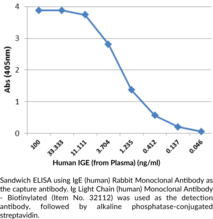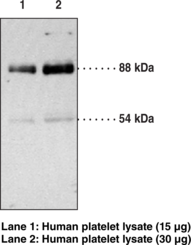Description
Immunoglobulin E (IgE) is a member of the immunoglobulin superfamily of glycoproteins that plays a central role in type I hypersensitivity reactions and the immune response to parasites.{28520,54323,54324} It is synthesized by B cells and later secreted by plasma cells and is the least abundant circulating antibody in human serum.{28520,54323} IgE consists of two light chains and two heavy chains, or ε chains, that contain one variable region and four Ig-like constant domains Cε1-Cε4, but lacks the flexible hinge region seen in IgD, IgG, and IgA.{54324,54325} The heavy chains are linked together by disulfide bonds to form an Fc region and also combine with the light chains to form the Fab region, which mediate receptor and antigen binding, respectively.{55171} IgE binds to type I Fcε receptors (FcεRIs) on the surface of mast cells, basophils, and antigen-presenting dendritic cells.{54323} Multivalent antigen binding to IgE on the surface of mast cells induces IgE crosslinking and mast cell degranulation to initiate type I hypersensitivity reactions, including, but not limited to, systemic anaphylaxis, wheal and flare responses, allergic rhinitis, bronchial asthma, and food allergies. Serum levels of IgE are elevated in response to parasitic infection and IgE directly binds parasites to target the parasite for eosinophil degranulation-induced destruction. Cayman’s IgE (human) Rabbit Monoclonal Antibody can be used for ELISA.
Synonyms: Immunoglobulin E
Immunogen: Human IgE
Formulation: 100 µg of protein A-affinity purified monoclonal antibody
Isotype: IgG
Applications: ELISA
Origin:
Stability: 365 days
Application|ELISA||Product Type|Antibodies|Monoclonal Antibodies||Research Area|Cardiovascular System|Blood|Serum Proteins||Research Area|Immunology & Inflammation|Adaptive Immunity||Research Area|Immunology & Inflammation|Allergy||Research Area|Immunology & Inflammation|Innate Immunity||Research Area|Immunology & Inflammation|Pulmonary Diseases|Asthma||Research Area|Infectious Disease|Parasitic Diseases



